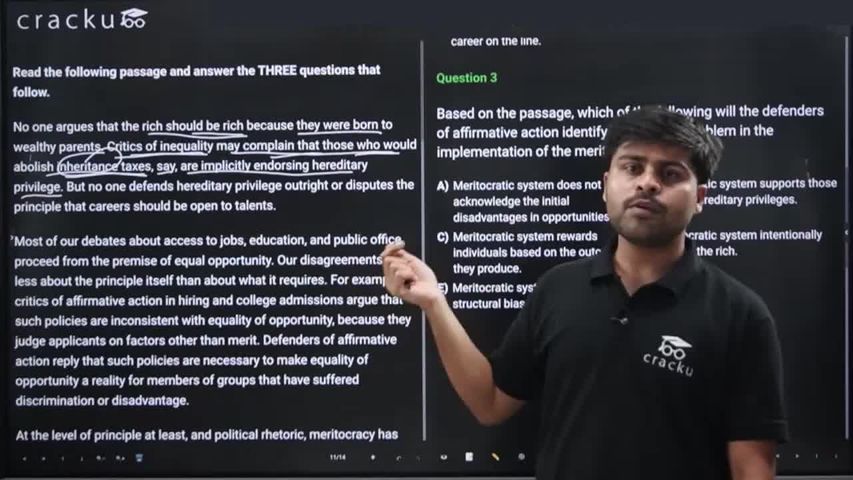Read the following passage and answer the THREE questions that follow.
No one argues that the rich should be rich because they were born to wealthy parents. Critics of inequality may complain that those who would abolish inheritance taxes, say, are implicitly endorsing hereditary privilege. But no one defends hereditary privilege outright or disputes the principle that careers should be open to talents.
Most of our debates about access to jobs, education, and public office proceed from the premise of equal opportunity. Our disagreements are less about the principle itself than about what it requires. For example, critics of affirmative action in hiring and college admissions argue that such policies are inconsistent with equality of opportunity, because they judge applicants on factors other than merit. Defenders of affirmative action reply that such policies are necessary to make equality of opportunity a reality for members of groups that have suffered discrimination or disadvantage.
At the level of principle at least, and political rhetoric, meritocracy has won the day. In democracies throughout the world, politicians of the center-left and center-right claim that their policies are the ones that will enable all citizens, whatever their race or ethnicity, gender or class, to compete on equal terms and to rise as far as their efforts and talents will take them. When people complain about meritocracy, the complaint is usually not about the ideal but about our failure to live up to it: The wealthy and powerful have rigged the system to perpetuate their privilege; the professional classes have figured out how to pass their advantages on to their children, converting the meritocracy into a hereditary aristocracy; colleges that claim to select students on merit give an edge to the sons and daughters of the wealthy and the well-connected. According to this complaint, meritocracy is a myth, a distant promise yet to be redeemed.
Based on the passage, which of the following inferences CANNOT be drawn?
Solution
Let us evaluate the given choices -
Option A: This is contrary to the idea presented in the passage: we are told that wealth and privilege do undermine meritocracy by rigging the system, enabling the wealthy to pass on advantages to their children, and turning meritocracy into a hereditary aristocracy.
Option B: This is consistent with the discussion. The author states that “our disagreements are less about the principle itself than about what it requires,” clearly highlighting a consensus on the principle but debates about its implementation.
Option C: The passage explicitly mentions that “politicians of the center-left and center-right” claim their policies promote meritocracy. This somewhat establishes its popularity across political ideologies (since members from opposing sides of the spectrum are involved).
Option D: This is also a valid point: the author notes that “no one defends hereditary privilege outright” while also suggesting that policies like abolishing inheritance taxes implicitly endorse it.
Option E: The passage states that “meritocracy is a myth, a distant promise yet to be redeemed,” and critiques that the system favours the wealthy and well-connected. Thus, the statement here aligns with the discussion.
Hence, Option A is the correct choice.
Video Solution

Click on the Email ☝️ to Watch the Video Solution
Create a FREE account and get:
- All Quant Formulas and shortcuts PDF
- 15 XAT previous papers with solutions PDF
- XAT Trial Classes for FREE
